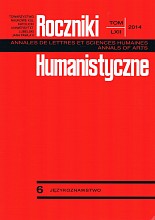ЗАУВАЖЕННЯ ДО ЕТИМОЛОГІЇ ЛЕКСЕМИ GRZECH – ГРІХ – ГРЕХНА МАТЕРІАЛІ ПОЛЬСЬКОЇ, УКРАЇНСЬКОЇ ТА РОСІЙСЬКОЇ МОВ
Observations on the Etymology of Lexemes grzech-гріх-грех Based on the Polish, Ukrainian and Russian Languages
Author(s): Przemysław PasiecznySubject(s): Language studies
Published by: Towarzystwo Naukowe KUL & Katolicki Uniwersytet Lubelski Jana Pawła II
Keywords: sin; etymology; Proto-Indo-European; Balto-Slavic; Christianity; The pre-Christian era
Summary/Abstract: The article is devoted to the etymology of the lexeme grzech (ps.*grěxъ ukr. гріх, rus. грех). The analysis based on an extensive dictionary material (etymological, dialect, and monolingual dictionaries of three Slavic languages: Polish, Ukrainian, and Russian) has shown that this lexeme’s hypothetical connection with *grěti should be entirely rejected. The research has also revealed a connection of this lexeme’s etymology with the reconstructed Balto-Slavic lexeme *groi̭s-os. The original meaning of that latter lexeme can be reconstructed as “curve, bending.” In time, the meaning altered to “mistake”. An in-depth analysis of the etymology of the lexeme grzech allowed the author to connect the above-mentioned root with the Proto-Indo-European core gers-/*ǵers-, which means “to turn, to twist, to bend”. In accord with this etymology, the lexeme grzech should be included in the group of Proto-Slavic words that were inherited by the Christian religious lexis in the Slavic countries. Thus, the group of words proposed by E. Klich, S. Rospond and S. Dubisz should now contain five words: bóg, święty, niebo, piekło, grzech
Journal: Roczniki Humanistyczne
- Issue Year: 62/2014
- Issue No: 06
- Page Range: 019-031
- Page Count: 13
- Language: Russian

